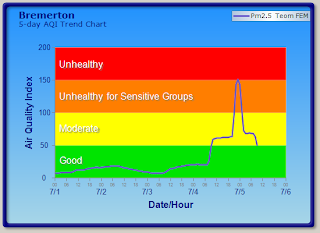 |
| Seattle after a recent fireworks show |
Wake up with a little cough this morning? Did the air in your neighborhood last night seem more like Beijing than the pristine Northwest?
It is not your imagination. Blame FIAP- Fireworks Induced Air Pollution
There was a decided degradation in our air quality late yesterday-- in fact, at some locations it was downright unhealthy for those of you with respiratory problems. Last night I was on the roof of my building at the UW watching the Lake Union fireworks--by the end of the wonderful performance a huge cloud of smoke had spread over the lake and towards the city. Scanning the horizon there was innumerable fireworks and a smoky miasma had spread over the region. It looked a bit like Gotham City in the Batman movies.
But what do the numbers show? Lets looks at the data!
An important parameter measured by many air quality agencies, such as the Puget Sound Clean Air Agency (PSCAA), is PM2.5 -- the concentration of particles with diameters less than 2.5 microns (millions of a meter). Such small particles can get through our bodies first line of defense (in our nose and airways) and move deep into our lungs. There they can irritate our air passages and cause significant problems for those with breathing problems.
Take a look at the air quality plots from a few stations (thanks to the PSCAA who produces them!). Their Air Quality Index is based on the PM2.5 number. (click to enlarge)
Bremerton spiked late in the day to the unhealthy category for all.
Darrington and Lynwood was unhealthy for sensitive groups.
Lake Forest Park and Seattle's Beacon Hill got into the moderate.
While Puyallup and Everett were REALLY bad.
It is interesting the some locations had a minor spike in the afternoon, a break for dinner, and then a big peak when the pyromaniacs really went at it during the evening.
The EPA-sponsored AirNOW program puts out hourly maps of the Air Quality Index. Here is one at 3:40 AM. You can see the problem downstream of the Puget Sound area (there were northerly and northwesterly winds aloft than blew the stuff to the SE).
Editorial Section
There was a lot of concern about the Fukushima radiation a few months ago, but quite frankly the health and other ill-effects of the fireworks are far, far greater. Not only was the air quality highly degraded last night but several kids lost fingers, one teenager was killed, a number of homes were torched, and how many dogs/cats were left shaking in a corner? My point is that when it comes to relative risk assessment we sometimes forget that the familiar risks have more negative impact on our lives than the exotic threats that get into the media (e.g., radiation, terrorism).
















Post a Comment